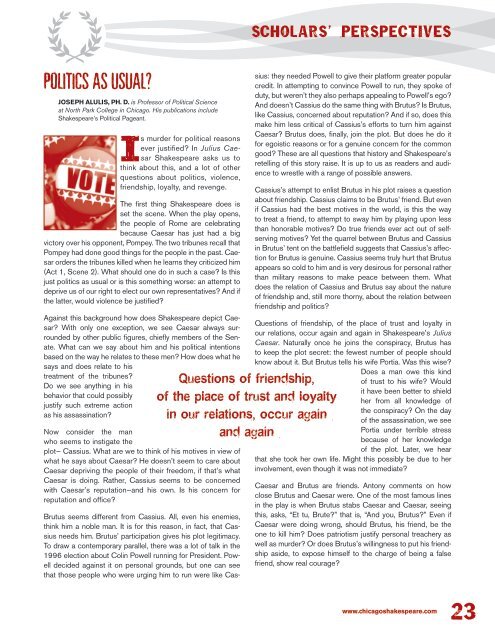Julius Caesar • 2013 - Chicago Shakespeare Theater
Julius Caesar • 2013 - Chicago Shakespeare Theater
Julius Caesar • 2013 - Chicago Shakespeare Theater
You also want an ePaper? Increase the reach of your titles
YUMPU automatically turns print PDFs into web optimized ePapers that Google loves.
POLITICS AS USUAL?<br />
JOSEPH ALULIS, PH D is Professor of Political Science<br />
at North Park College in <strong>Chicago</strong>. His publications include<br />
<strong>Shakespeare</strong>’s Political Pageant.<br />
Is murder for political reasons<br />
ever justified? In <strong>Julius</strong> <strong>Caesar</strong><br />
<strong>Shakespeare</strong> asks us to<br />
think about this, and a lot of other<br />
questions about politics, violence,<br />
friendship, loyalty, and revenge.<br />
The first thing <strong>Shakespeare</strong> does is<br />
set the scene. When the play opens,<br />
the people of Rome are celebrating<br />
because <strong>Caesar</strong> has just had a big<br />
victory over his opponent, Pompey. The two tribunes recall that<br />
Pompey had done good things for the people in the past. <strong>Caesar</strong><br />
orders the tribunes killed when he learns they criticized him<br />
(Act 1, Scene 2). What should one do in such a case? Is this<br />
just politics as usual or is this something worse: an attempt to<br />
deprive us of our right to elect our own representatives? And if<br />
the latter, would violence be justified?<br />
Against this background how does <strong>Shakespeare</strong> depict <strong>Caesar</strong>?<br />
With only one exception, we see <strong>Caesar</strong> always surrounded<br />
by other public figures, chiefly members of the Senate.<br />
What can we say about him and his political intentions<br />
based on the way he relates to these men? How does what he<br />
says and does relate to his<br />
treatment of the tribunes?<br />
Do we see anything in his<br />
behavior that could possibly<br />
justify such extreme action<br />
as his assassination?<br />
Now consider the man<br />
who seems to instigate the<br />
plot— Cassius. What are we to think of his motives in view of<br />
what he says about <strong>Caesar</strong>? He doesn’t seem to care about<br />
<strong>Caesar</strong> depriving the people of their freedom, if that’s what<br />
<strong>Caesar</strong> is doing. Rather, Cassius seems to be concerned<br />
with <strong>Caesar</strong>’s reputation—and his own. Is his concern for<br />
reputation and office?<br />
Brutus seems different from Cassius. All, even his enemies,<br />
think him a noble man. It is for this reason, in fact, that Cassius<br />
needs him. Brutus’ participation gives his plot legitimacy.<br />
To draw a contemporary parallel, there was a lot of talk in the<br />
1996 election about Colin Powell running for President. Powell<br />
decided against it on personal grounds, but one can see<br />
that those people who were urging him to run were like Cas-<br />
Questions of friendship,<br />
of the place of trust and loyalty<br />
in our relations, occur again<br />
and again<br />
SCHOLARS’ PERSPECTIVES<br />
sius: they needed Powell to give their platform greater popular<br />
credit. In attempting to convince Powell to run, they spoke of<br />
duty, but weren’t they also perhaps appealing to Powell’s ego?<br />
And doesn’t Cassius do the same thing with Brutus? Is Brutus,<br />
like Cassius, concerned about reputation? And if so, does this<br />
make him less critical of Cassius’s efforts to turn him against<br />
<strong>Caesar</strong>? Brutus does, finally, join the plot. But does he do it<br />
for egoistic reasons or for a genuine concern for the common<br />
good? These are all questions that history and <strong>Shakespeare</strong>’s<br />
retelling of this story raise. It is up to us as readers and audience<br />
to wrestle with a range of possible answers.<br />
Cassius’s attempt to enlist Brutus in his plot raises a question<br />
about friendship. Cassius claims to be Brutus’ friend. But even<br />
if Cassius had the best motives in the world, is this the way<br />
to treat a friend, to attempt to sway him by playing upon less<br />
than honorable motives? Do true friends ever act out of selfserving<br />
motives? Yet the quarrel between Brutus and Cassius<br />
in Brutus’ tent on the battlefield suggests that Cassius’s affection<br />
for Brutus is genuine. Cassius seems truly hurt that Brutus<br />
appears so cold to him and is very desirous for personal rather<br />
than military reasons to make peace between them. What<br />
does the relation of Cassius and Brutus say about the nature<br />
of friendship and, still more thorny, about the relation between<br />
friendship and politics?<br />
Questions of friendship, of the place of trust and loyalty in<br />
our relations, occur again and again in <strong>Shakespeare</strong>’s <strong>Julius</strong><br />
<strong>Caesar</strong>. Naturally once he joins the conspiracy, Brutus has<br />
to keep the plot secret: the fewest number of people should<br />
know about it. But Brutus tells his wife Portia. Was this wise?<br />
Does a man owe this kind<br />
of trust to his wife? Would<br />
it have been better to shield<br />
her from all knowledge of<br />
the conspiracy? On the day<br />
of the assassination, we see<br />
Portia under terrible stress<br />
because of her knowledge<br />
of the plot. Later, we hear<br />
that she took her own life. Might this possibly be due to her<br />
involvement, even though it was not immediate?<br />
<strong>Caesar</strong> and Brutus are friends. Antony comments on how<br />
close Brutus and <strong>Caesar</strong> were. One of the most famous lines<br />
in the play is when Brutus stabs <strong>Caesar</strong> and <strong>Caesar</strong>, seeing<br />
this, asks, “Et tu, Brute?” that is, “And you, Brutus?” Even if<br />
<strong>Caesar</strong> were doing wrong, should Brutus, his friend, be the<br />
one to kill him? Does patriotism justify personal treachery as<br />
well as murder? Or does Brutus’s willingness to put his friendship<br />
aside, to expose himself to the charge of being a false<br />
friend, show real courage?<br />
www.chicagoshakespeare.com 23




